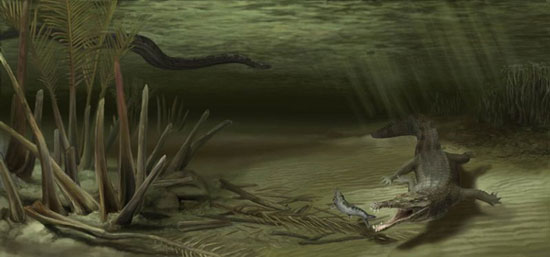Detecting giant crocodile fossils 6 meters long
A new group of American researchers found fossils of a 6m-long, extinct giant crocodile in a coal mine in Colombia. This finding was published in the journal Paleontology by US researchers.
>>>Discovered a prehistoric crocodile species in Thailand
>>> Found 'cat crocodile' fossil in East Africa
Fossils are found in Cerrejon mine in northern Colombia, one of the largest coal mines in the world. Perhaps this giant crocodile must live at the same time as the world's largest snake and can even compete with it.
This freshwater crocodile, named Acherontisuchus guajiraensis , lives in the ancient rainforest ecosystem about 60 million years ago during the Palaeocene period.
The habitat was then dominated by reptiles, including giant snakes, turtles and crocodiles. This is the fossil associated with the second crocodile excavated from the Cerrejon mine.

Giant crocodiles eat fish that can compete with giant snakes (Photo: BBC)
The temperature at the time was much higher than it is now, and scientists say that studying the diversity of animals in this ecosystem can help them better understand the climate impact in the future. hybrid
It lived at the same time as the giant snake called Titanoboa , which could be up to 13m long.
Scientists say that A. guajiraensis specializes in eating fish, which means it will compete with Titanoboa for food.
'Young individuals are definitely not safe with Titanoboa snakes, but the biggest crocodile can fight more for 13m snakes , ' said lead author Alex Hastings, from the Florida Museum of Natural History. to speak.
New species belong to a group of major crocodiles that live in the ocean, or are coastal reptiles.
With this fossil the adult crocodile will present new challenges to the previous theory that animals have entered the freshwater environment when young and then return to the sea.
This crocodile is the largest of all crocodiles living at that time and compared to crocodiles today.
- Detecting huge crocodiles, swallowing people
- Ancient crocodile monsters weigh three tons living under the sea
- Jurassic fossils reveal a new long muzzle crocodile
- Discover the giant 10-meter-long crocodile vestiges specialized in hunting dinosaurs
- Close up of fossils of crocodiles, elephants, giant prehistoric birds
- Video: 4m long crocodile devoured its kind
- The 4.2-meter monster crocodile traps Australian hunters
- Giant crocodile is nearly 5m long
- Detecting ancient crocodiles 11 meters long
- 6m long crocodile fish bait in Australia
- Video: Crocodile expert holds a giant crocodile stick and the end
- Detecting fossils dinosaurs across the 7-storey building
 Discovered an ancient centipede fossil 99 million years old
Discovered an ancient centipede fossil 99 million years old Discovered bat-like dinosaurs in China
Discovered bat-like dinosaurs in China Discovered a 200-year-old bronze cannon of the coast
Discovered a 200-year-old bronze cannon of the coast Discover 305 million-year-old spider fossils
Discover 305 million-year-old spider fossils Baby monkey falls into crocodile cage and the unexpected ending
Baby monkey falls into crocodile cage and the unexpected ending  Peru announces crocodile fossil dating back more than 10 million years
Peru announces crocodile fossil dating back more than 10 million years  This is the oldest crocodile in the world
This is the oldest crocodile in the world  100 million years ago, the Sahara Desert was inhabited by crocodiles that could run like athletes
100 million years ago, the Sahara Desert was inhabited by crocodiles that could run like athletes  MMA wrestler uses his bare hands to catch a crocodile
MMA wrestler uses his bare hands to catch a crocodile  The tiger was fighting the wild boar when the crocodile suddenly appeared, what will happen?
The tiger was fighting the wild boar when the crocodile suddenly appeared, what will happen? 